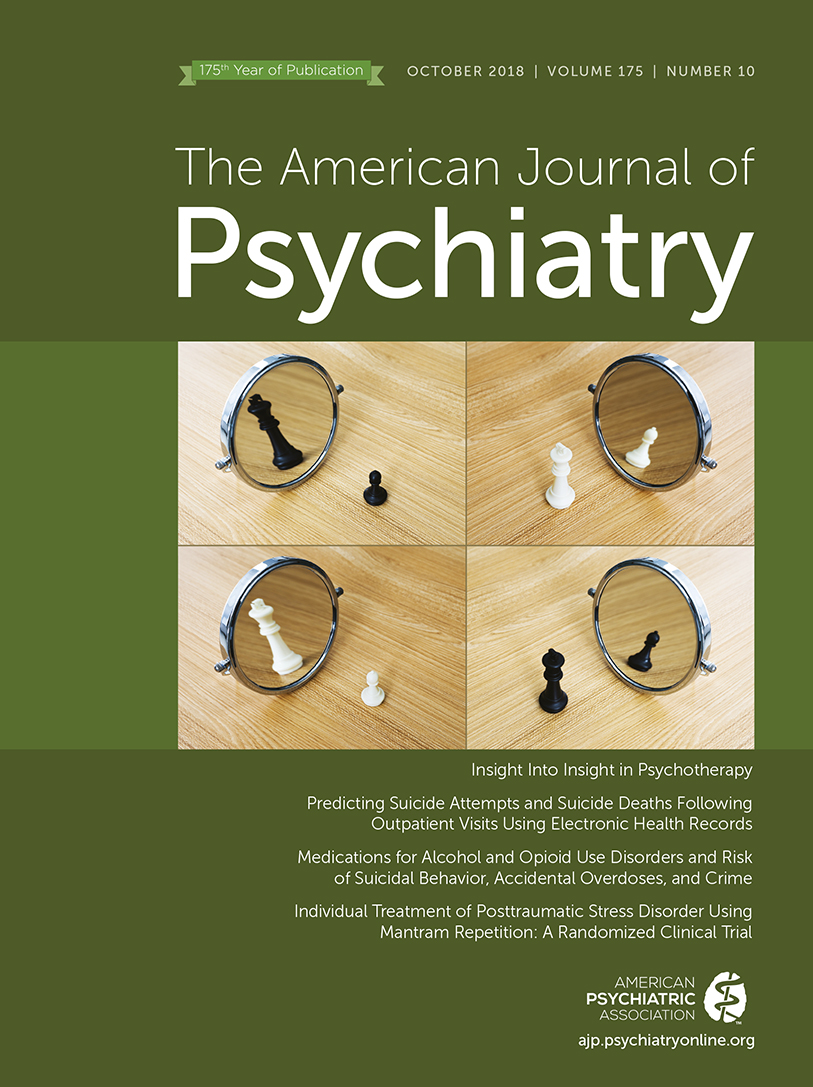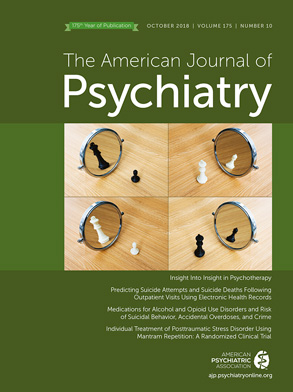There have been more than 5,000 randomized controlled trials of psychotherapy. Most meta-analyses conclude that psychotherapy is effective for a range of disorders, and different modalities of therapy are equally effective. However, studies with the strongest research designs indicate that psychotherapy may be considerably less effective than we tend to believe (
1). In fact, different psychotherapies may be equally ineffective. Too many patients fail to respond or continue to experience residual symptoms after treatment termination. All treatments for mental disorders have a wide margin for improvement.
Mental health professionals still believe that psychotherapy can be improved by theoretical discussion, logic, and expert opinion (
2). This may be one of the reasons for the existence of several hundred “brand name” psychotherapies. However, in order to improve clinical theories, treatment interventions, and training, we need to identify how psychotherapy works—the mechanisms of change underlying the treatment effects (
3). It is only with the specification of mediators of change, whether psychological (
3) or biological (
4), that the field will move forward. Many mechanisms may have an impact in the complex process of psychotherapy, but insight is regarded as one of the most important mechanisms of change, not only in dynamic psychotherapy (
5) but also, increasingly, in cognitive behavioral therapy (
6) and experiential psychotherapy (
7).
In this regard, the study reported in this issue of the
Journal by Jennissen and colleagues (
8) is timely. This is the first meta-analysis of studies with data on the insight-outcome correlation. The meta-analysis is generally well done, with all of the elements that one would want to see—checks for heterogeneity, study quality, weighting, risk of publication bias. The authors screened more than 12,000 abstracts, assessed 261 full-text papers, and ended up with 22 studies (with 23 effect sizes). Their definition of insight is broad, but it is mainstream and reasonably accurate. They define it as “patients’ understanding of associations between past and present experiences, typical relationship patterns, and the relation between interpersonal challenges, emotional experience, and psychological symptoms.” The eligibility criteria used are sensible. Although determining which studies to include in a meta-analysis is a notoriously difficult gray area, study selection seems carefully implemented. Data extraction also seems reasonable, given the design limitations in many (most?) of these studies. Two authors independently assessed study quality (risk of bias), and interrater reliability on these assessments was high. Risk of bias varied from high to low among the studies. Patients were mostly diagnosed with mood, anxiety, somatoform, eating, and cluster C personality disorders. Twelve treatments were psychodynamic and 11 were other treatments, such as cognitive-behavioral, emotion-focused, client-centered, and interpersonal psychotherapy. The studies used 27 different outcome measures and 18 different insight measures. Most measures of insight were clinician rated. Tests of heterogeneity indicated significant variation in effect sizes and a moderate to high degree of “true” heterogeneity.
This meta-analysis has limitations, largely because of the nature of the studies included. As outlined above, there was considerable variety in psychopathology, and treatments varied in theoretical orientation. The studies employed various designs to associate insight and outcome. None of the studies had a preregistered study protocol, and researcher allegiance effects could not be evaluated. When a meta-analysis includes different treatments for a range of psychiatric disorders, a number of different outcome measures, and different measurement designs, the otherwise sensible approach of lumping data together to address the problem of small samples may develop into a progressively messy endeavor, confounding the clinical relevance of the findings. To offset some of these validity threats, the authors commendably addressed many design issues and described relevant details of what was actually tested in each study. In this way, readers may be helped to draw their own conclusions regarding the validity of the findings.
Jennissen et al. report a consistent pattern of associations between insight and outcome across disorders and therapy types. There was a significant moderate relationship (r=0.31) between insight and treatment outcome. The study was not powered to detect moderators of the insight-outcomes associations. Overall, the findings constitute preliminary support for the importance of insight in different forms of psychotherapy.
Jennissen and colleagues’ choice to include many different diagnoses and different treatments in their meta-analysis may reflect current developments in our field. Given the shared brain circuitry, genes found across disorders, medications used across disorders, and the reality of considerable comorbidity, there is growing recognition that only a few domains of dysfunction may extend across the many DSM diagnostic categories. Caspi et al. (
9) have argued that psychopathology could be explained with one general psychopathology dimension. The Research Domain Criteria initiative of the National Institute of Mental Health focuses on only a few domains of dysfunction, social processes being one of them. Transdiagnostic approaches and unified
trans-theoretical treatment protocols may improve future research.
Jennissen and colleagues’ meta-analysis estimated a moderate association between insight and psychotherapy outcome across diagnostic categories and different schools of psychotherapy. Its magnitude is comparable to effect sizes of established treatment factors, such as therapeutic alliance. A large number of studies have documented a moderate but consistent relationship between therapeutic alliance and outcome, across different treatments and diagnoses (
10). Brain changes, too, mainly in the prefrontal cortex, cingulate gyrus, and amygdala, are associated with symptom improvement across different diagnoses and treatments (
11). However, an association with outcome is necessary but not sufficient. Just like insight and alliance, brain changes may be a consequence of symptom change or a proxy for some other therapeutic change processes. Further longitudinal research with study designs that include most or all steps in mediation research is necessary to establish insight, or alliance, or brain changes as mechanisms for treatment outcome. In our own research into the effect of insight on the outcome of psychotherapy, my colleagues and I found that use of a specific technique in dynamic psychotherapy (transference work) increased gain of insight during therapy substantially, with a subsequent improvement in outcome (
12).
The crucial questions are: Which therapist interventions and treatment processes increase insight, or strengthen the alliance, or influence the desired brain changes? Nonetheless, this study is a first important step to establishing insight as a possible mechanism of change in psychotherapy and may serve to challenge investigators to conduct more rigorous evaluations of the insight-outcome relationship to advance knowledge.

